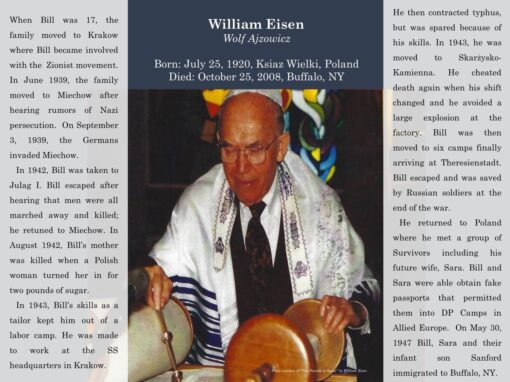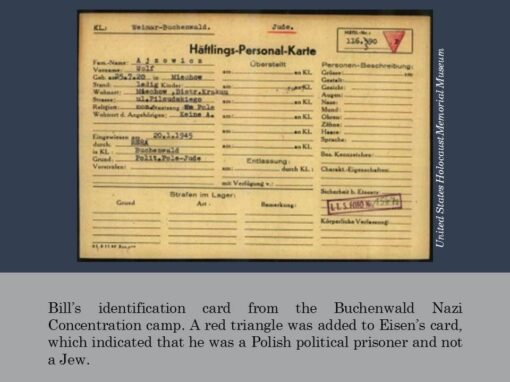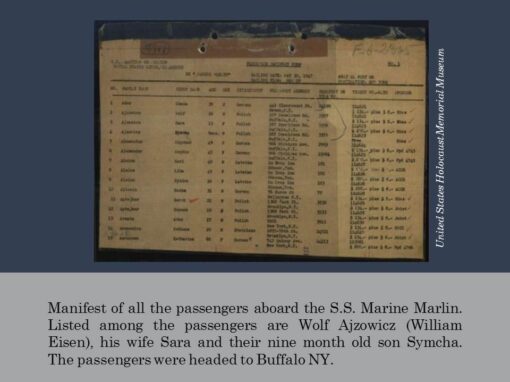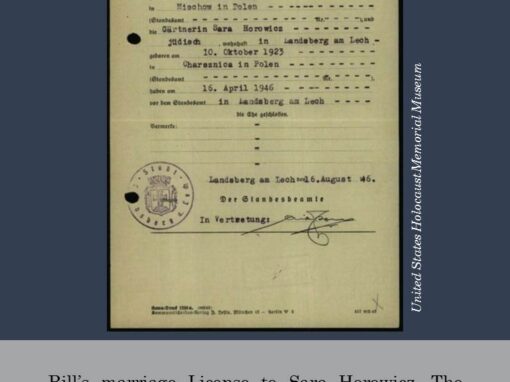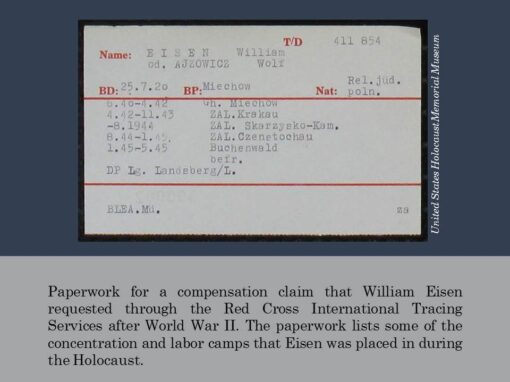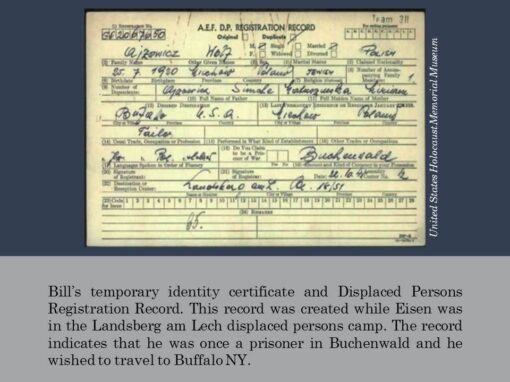William “Bill” Eisen
Died on October 25, 2008 in Buffalo, NY
William Eisen’s Biography
Pre-War Poland
Bill Eisen was born on July 25, 1920 in Książ Wielki, Poland to Miriam Matuszynski and Symcha Ajzowicz. A year after William was born his family moved to the town of Miechow. The family consisted of 6 children: Meyer was the oldest, then Sara, Alter, Lemuel, Izrael, and Bill. They did not have much growing up; they lived in a one-room house with a dirt floor, and to have a potato during the winter was a big deal. The children attended state-run public Catholic schools where Jewish students were the minority and were often mistreated by their Catholic administrators. Alter and Lemuel were tailors and because the family could not afford high school for Bill, they taught him how to be a tailor; when Bill was 17, the family moved to Kraków, where Lemuel joined the Polish army.
Living in Kraków, Bill became involved with a socialist Zionist movement even though communism was illegal in Poland. There was also a large anti-Semitic political party in Poland, called the National Democracy, which supported Hitler and threatened the lives of Jews. In June 1939, the Ajzowicz family moved back to Miechow after German and Austrian refugees told of concentration camps and further violence against Jews. On September 3, 1939, the Germans invaded Miechow and began their humiliation of the Jews and the Aryanization of Jewish property. In December, the Nazis issued a decree that all Jews had to identify themselves, even ones who had converted to Christianity and become anti-Semites themselves.
Life in the Ghetto
The Miechow ghetto was built in November 1940, Two or three families lived in each house, and food was scarce. In the beginning, it was still possible to sneak out and obtain food or speak to people living outside the ghetto. Izrael was one of the first men taken to a labor camp. He was sent home three months later due to illness. Meyer escaped to Wiślica, a small town just east of Miechow. In February 1942, Bill, Alter, and Izrael were taken to Julag I, a Judenlager (Jewish camp), just outside of Kraków, where they were forced to do hard labor. One morning, Bill and Alter came back from work and discovered that all the men in the camp hospital, including Izrael, had been marched away and killed. Alter and Bill managed to escape from Julag I and took the train back to Miechow.
In August 1942, the surrounding ghettos began to be liquidated. The Miechow ghetto had been chosen to go through a selection to eliminate anyone who could not work. Bill’s parents had been selected, so he and his siblings attempted to hide them. Unfortunately, their landlord disclosed the location where Bill’s father was hiding, and his mother was turned in by a Polish woman for a reward of two pounds of sugar.
On September 4, 1942, the Miechow ghetto underwent another selection. Alter had gone into hiding, and his sister Sara had already left for work, leaving Bill and Meyer’s oldest daughter Lea to fend for themselves. Around 1500 Jews were taken from the Miechow ghetto that day and sent to camps, where they were murdered. Before the mass deportation, the guards asked for men who wished to go to a labor camp, and on the urging of his girlfriend Esther, Bill volunteered.
Alter, who had been turned in, boarded the train with Bill. After 52 hours on the train, which only traveled 16 miles, and a three-hour march, the men arrived at Julag II, located in the Prokocim suburb of Kraków. Soon after, Alter successfully escaped and went back to Miechow. Bill also escaped but missed the ferry in Kraków and had no other choice but to return to Julag II, upon his return to Julag II, Bill learned that every Jew in Wiślica, including Meyer, had been shot. Alter sent for Bill, signaling that it was safe to go back to Miechow, which had only 200 inhabitants left.
Surviving the Camps
In February 1943, Bill was taken back to Julag I and Alter was taken to a labor camp near Krakow. Luckily, Bill’s tailoring skills helped him to get a job in the SS Headquarters in Kraków, where he was able to make new uniforms to soldiers and receive better food rations. Tailoring saved his life a second time when he contracted typhus, but was not killed because he was a skilled worker. In September, one thousand prisoners were taken from Julag I, robbed of their valuables, quarantined for two days with no food or water, and spentthree more days without food or water on a train to another camp.
The prisoners had arrived at the Skarżysko-Kamienna labor camp. They were greeted by seemingly alien figures that wore a bright yellow color and, clothed in paper bags. Nothing grew in or around the camp and prisoners only lasted a few months. The Skarżysko-Kamienna camp was used to build explosives which contained toxic chemicals that poisoned the prisoners. Bill cheated death twice in this camp. One day, after reporting for his morning shift, Bill was told that he had been assigned to a later shift, thus escaping the large explosion that shook the factory that morning. A few months later Bill became deathly ill, and in this camp that meant that you were eventually selected for death. Another man who was a tailor in Julag I happened to notice Bill’s condition and he and his wife nursed Bill back to health.
In July 1944, Bill and other prisoners were again loaded into cattle cars. After three days, they arrived at Hasag-Rakov, a steel mill outside the town of Czestochowa. The conditions in this camp were significantly better, as it was run by a Jewish elder and one Jewish policeman. In January 1945, with the Russians advancing into Poland, Rakov was evacuated. 700 prisoners were loaded into cattle cars with three days’ worth of food for a five-day journey to Buchenwald, where they were immediately put through another selection, deloused, completely shaved, disinfected, assigned a number, and put into quarantine.
In February 1945, 300 prisoners were selected, given extra food and clothing, and again loaded into cattle cars. Four days later, they arrived in Staßfurt, and worked in a camp called Leopoldshall building airplane parts in a salt mine. On April 8, 1945, with the Americans and Russians closing in, the camp was evacuated. Nine hundred prisoners began the march towards the Theresienstadt camp, in the modern-day city of Terezín in the Czech Republic.
Four weeks later, after having very little to eat, fighting illnesses from eating grasses and garbage, and receiving abuse from villagers, the prisoners were abandoned by their German guards on a hill in the village of Annaberg-Buchholz. Bill and two other men took the opportunity to escape, went into town, found food and clothing, and came across two Russian soldiers.
Liberation and Post-War Europe
The two Russian soldiers took Bill and the two other men into the village and ordered a woman to house them for the night. The next day the Russians left Annaberg-Buchholz, replaced by the Americans, who put Bill in the hospital for two weeks, reportedly weighing a mere 75 pounds. After he was released in May 1945, he obtained papers that would allow him to travel back to Poland. It took 3 weeks for Bill to return to Miechow, only to find that 25 Jews were left. A Catholic schoolmate who remembered Bill gave him work as a tailor, but after a short time, it became too dangerous for Bill to stay in Miechow. Remnants of an underground resistance group called the Armia Krajowa (AK), translated “Home Army,” targeted Jews who returned after the war and committed violent acts against them. Bill fled Miechow and went to live with his second cousin Sara and her fiancé Jacob in Sosnowiec. The day before their wedding, Jacob was killed by the AK.Bill’s wife, Sara was also a survivor of the war. She had been imprisoned in the Krakow-Płaszów camp where she had interacted with Alter, Auschwitz where she had escaped selection for the gas chambers, and then finally in the Lichtwerden camp in modern day Svĕtiá in the Czech Republic. Sara was liberated by the Russians at the age of 22 on May 8, 1945.
Bill and Sara decided to leave Poland and joined a group called Bricha, which illegally smuggled Polish Jews into Palestine. In July 1945, they left Poland with fake identification, crossed the Czech border, secretly crossed the Hungarian border, and crossed into Judenburg, Austria. Bill and Sara were married August 6 in a displaced persons camp in Budapest. In the displaced persons camp in Austria, where Bill had experienced further antisemitism from the camp commandant who favored former SS officers over the Jewish refugees, he also discovered that the British, who were occupying Palestine, did not want Jews entering Palestine. Thus in December 1945, Bill and Sara followed a cousin to Landsberg am Lech, Bavaria, where there was an American-run displaced persons camp. It was here that Bill learned of Alter’s death and the survival of his sister Sara.
Bill contacted his mother’s brother who lived in the United States as a potential sponsor for immigration. On August 6, 1946, their son Simcha, now known as Sanford, was born in the DP camp. On May 30, 1947 Bill, Sara, and Sanford boarded a ship to America and arrived in New York City on June 7, 1947.
Life in America
Coming to America was quite a shock for Holocaust survivors. They were suspicious of anyone who wanted to help them and hoarded food because they were used to such strict rations. In his book “Two Pounds of Sugar,” Bill describes how the train ride to meet his uncle made him sick because it reminded him of the cattle cars in which he had spent so much time. Bill, Sara, and Sanford arrived at the Central Terminal in Buffalo, New York to meet his uncle. As far as Bill knew, they were the first survivors to arrive in Buffalo. Not long after their arrival, people from Miechow who had fled before the war came to see them. Nobody would believe the stories that Bill and Sara told, and Bill’s uncle sent them to a psychiatrist who deemed them merely undernourished.
Bill and his family soon moved into their own apartment. Bill got a job at Blum’s tailor shop in downtown Buffalo, and his sister Sara and her family finally joined them in Buffalo. In 1950, Bill enrolled in classes at School 17 to learn English and graduated from Hutchinson Central Technical High School in 1953. Bill and Sara’s second son Bernie was born in 1952. Bill eventually left Blum’s tailor shop and joined the alterations department at Kleinhans Department Store. In a matter of years, Bill went from being manager to Director of Alterations at all Kleinhans stores and traveled the country giving presentations. In 1956 Bill’s wife Sara was diagnosed with multiple sclerosis, which Bill strongly believed was a result of a blow to her back that she suffered when she was in Auschwitz. Sara passed away in 2001 and Bill passed away in 2008.
“May God grant wisdom and strength to our country’s leaders and to the people of our great country to fight evil wherever it may exist. Then the sufferings of humanity may be eased forever.” – Bill Eisen
CLICK ON THE IMAGES BELOW TO LEARN MORE ABOUT WILLIAM’S STORY
WATCH THE VIDEO BELOW TO LEARN MORE ABOUT WILLIAM’S STORY
CLICK HERE TO REQUEST A SPEAKER
Our speakers can present in person or online.
Our speakers are all volunteers. An honorarium to HERO is greatly appreciated. We are a non-profit organization and honorariums make a significant difference in our ability to continue our impactful work.
"*" indicates required fields


